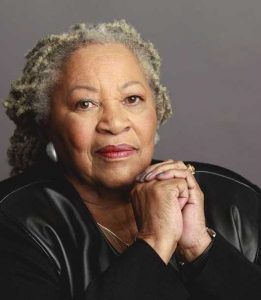What Price thinks:
After Reading Toni Morrison’s book, Song of Solomon, I can see why some readers would find offense. The language used and some descriptions within the novel can be triggering to those who are uncomfortable with themes such as suicide, foul language, and sexually explicit situations. However, in the context of the novel, I believe the author has every right to cover these themes and should be praised for her work in Song of Solomon. The controversy in St. Mary’s county came from the complaint of a parent, who photo copied two graphic pages from the book, and was upset with the themes. But these pages were taken out of context. In the context of the novel it is accepted that these words be said. Given the situation in a small town diner with Guitar and the locals, they were there to make Milkman feel uncomfortable, to make him feel unwelcome. If the picture that Toni Morrison painted was so vivid that it disturbed her readers, she did her job right. The parent coming out against the novel should be interpreted as an accolade to her writing ability and not taken as an offense.
When readers are upset enough to take action against a novel, they try to acquire public support for how they feel. In this case, the parent did not start with public outrage against the book but rather attempted to have it removed from the list silently. After St. Mary’s county schools replied with how to properly write a complaint, she went to the public. The public display in some of the newspapers seemed to make race a driving issue, but the complaint from the parent did not mention race. The parent targeted the sexual explicitness and language in the novel. Am I certain that race was a factor in removing the book from the reading list? No, however, I do believe that with little evidence presented to the superintendent’s office, race of the author and protagonist in the novel cannot be ignored or factored out.
The book was still available to students and members of the community at the public library, and sold out in bookstores during the controversy. This proves that the harder someone tires to censor literature, the more desirable it becomes.
What Drexel thinks:
Censorship is a slippery slope. I understand why parents would like to protect their children from how ugly the world can be. However, in the specific case of Song of Solomon by Toni Morrison, the world’s ugliness is not promoted. Nothing in the novel encourages readers to take part in actions like those portrayed. It conjures empathy for the main character and draws pain from a deep place in readers. Its graphic portrayals simply mirror how graphic real life can be.
Advanced placement students are required to analyze literature at a collegiate level. David Flood, the teacher who assigned Song of Solomon, said something that stuck with me. He reflected on how parents do not demand that colleges withhold graphic material from students. There is a certain level of trust in the institution to construct curriculum that it appropriate for the development of its students. While students are 17-18 in high school they are further subject to the beliefs of their parents, but a year later in college parental concerns seem to evaporate.
I disagree with parents being able to circumnavigate a school board that was constructed of faculty, staff, and parents to decide a book’s appropriateness. It is my opinion that the school caved to the pressures of parental concern without due consideration of the author or the novel’s literary merits. I do not believe that every superintendent or county commissioner should read every novel that is taught in their schools, but they should trust the teachers and board they appointed to do just that.
It is difficult to agree with the opposition’s reasoning. Parents that wanted the Song of Solomon removed offered no alternatives and went as far as calling the book “pure trash.” This shows a lack in literary interpretation and disrespects the academic institutions that repeatedly praise this novel. It is one thing to disagree with and condemn institutions that are in place, but to do so while offering no alternative is irresponsible. Parental concerns about explicit content are valid, but to assume children will imitate the acts of the characters does not make sense. Applying this reasoning in a different context reveals its absurdity. For example, people are introduced to the Bible at young ages. It contains themes of rape, sodomy, murder, incest, and much more. However, communities do not ban the Bible. Instead, it is interpreted, referenced, reflected upon, and used as an educational source. Society simply does not anticipate people will commit incest or murder their brothers because they read about it in the Bible.
Authors like Toni Morrison provide context for their characters’ actions, and the context in Song of Solomon does not encourage incest, drug use, or bad language in anyway. It also does not promote immorality. It promotes introspective growth from a voice that is heard far too little in academia. For the longest time I grappled with the real context for the book’s banning, the book was removed from the AP reading list, which is the same thing as banning it. On a surface level it appears that parents that opposed the book were displeased with the graphic content, but their battle to remove this type of content starts and stops with a black female author. Had there been more consistency in the parents’ message, their opposition would be more believable and genuine.
I believe that censorship should be mandatory in some cases. Books that directly encourage hatred or violence should not be promoted in any way. The is judicial precedent that a publisher can be held liable for the content published in its books. In 1999, Paladin Press was sued in [name of court] because a reader used its guide on becoming a hitman to murder a family. This case shows that books designed to specifically promote violence against others are not protected by the First Amendment. As long as literature does not actively promote violence, it deserves First Amendment protection.
Here is a link to the criminal podcast mentioned.





